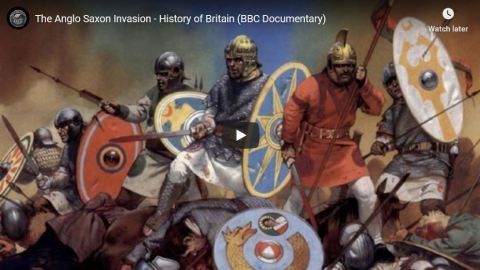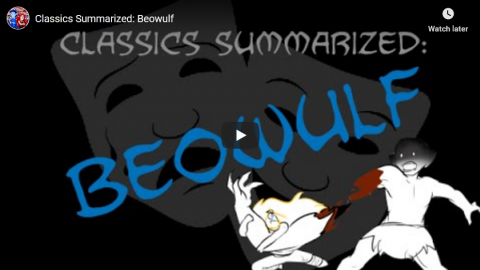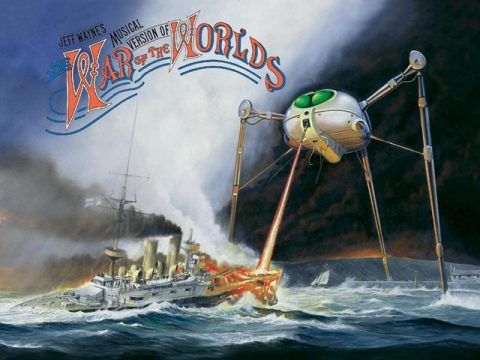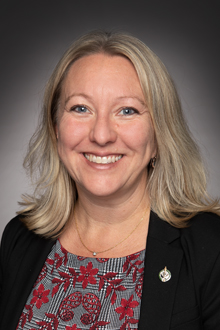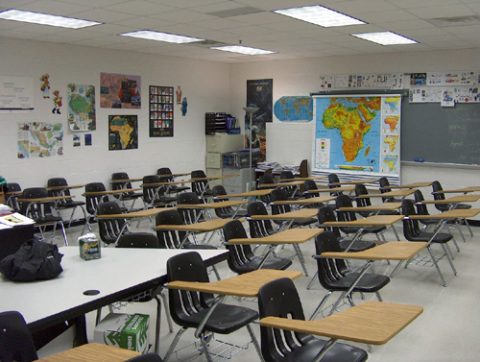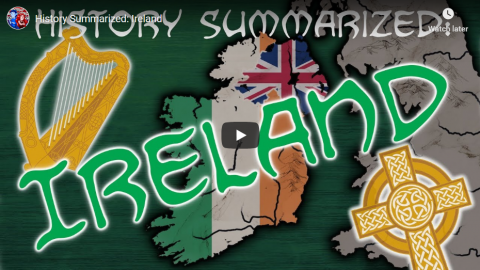Johnny66
Published 21 Jun 2015A well-considered documentary by the noted scholar, Dr Francis Pryor. The names Cerdic, Ceawlin, Cedda and Caedwalla are not exactly Germanic in origin? Cerdic’s father, Elesa, has been identified by some scholars with the Romano-Briton Elasius, the “chief of the region,” met by Germanus of Auxerre.
April 7, 2020
Britain AD: The Invasion That Never Was – The Anglo-Saxon Invasion (BBC Documentary)
Classics Summarized: Beowulf
Overly Sarcastic Productions
Published 28 Aug 2015Beowulf! The tale of the baddest Geat to ever Geat.
Tolkien said that the Dragon in Beowulf is one of only two *true* dragons in all of literature — the other being Fafnir. The influence of both these dragons is very visible in a lot of our more modern fantasy: for instance, where Beowulf’s Dragon inspired Smaug, o chiefest and greatest of calamities, Fafnir inspired C. S. Lewis to include that cursed bracelet thing that turned Eustace into a dragon in Voyage of the Dawn Treader. And I think we all know the badder of those two dragons, so I guess Tolkien — and, by extension, Beowulf — wins this round.
Where was I? Right. BEOWULFFFFF
PATREON: https://www.patreon.com/user?u=4664797
MERCH LINKS:
Shirts – https://overlysarcasticproducts.threa…
All the other stuff – http://www.cafepress.com/OverlySarcas…Find us on Twitter @OSPYouTube!
April 4, 2020
QotD: The danger of studying philosophy
I quickly learned that […] many of my professors valued paradoxical and obscure arguments. And I got pretty good at making them. In an essay on Wallace Stevens, I concluded by asserting, “If everything is nothing, then that nothingness is everything. For poetry to encompass one, it encompasses the other. When Stevens’s mind of winter descends into the inescapable nothingness of his subjectivity, he has claimed for himself the totality of everything.” I don’t know what this means. But I wrote it and I was rewarded for it.
I knew my analysis of Wallace Stevens would please my professor, but I was bothered by a nagging thought that I really didn’t understand Wallace Stevens. I wondered if my graduate school training just amounted to a parlor trick. Last year, at my high school, the students enjoyed arguing if a hotdog is a sandwich, the millennial equivalent of asking how many angels can dance on the head of a pin. The hotdog question made its way to the whiteboard in our staff lounge. By the time I arrived, my colleagues had written their responses. Some argued that a hot dog is not a sandwich because a sandwich requires two pieces of bread and a hotdog bun isn’t supposed to separate. Others averred that it most definitely is a sandwich: Meat between bread is a sandwich, end of story. I saw these responses and thought, “Simpletons!” before putting my graduate education to work: “In order to determine if a ‘hotdog is a sandwich,’ we must first determine the proper understanding of ‘is’ for if we do not grasp the ontological necessity of being itself, we fall into an abyss wherein ‘being’ is and is not itself and thus a hotdog is and is not a sandwich for it is and is not its very self.” I was quite amused by the whole situation until a colleague told me that a student had seen the whiteboard and said he wanted to study philosophy so that he could write like me.
S. A. Dance, “Incomprehension 501: Intro to Graduate School”, Quillette, 2018-03-06.
April 3, 2020
“And what are your personal pronouns?”
Last week, Amy Alkon considered the demands of “pronoun authoritarians”:
Personally, I’m disturbed by the whole notion that we “include” people through calling them the right pronoun, which requires all this “homework” about a person before you say one word to them.
This new requirement for doing this seems to be a sort of religion that allows people to have power over others — to push them around and deem them thought and speech criminals, even if they simply forget to use somebody’s requested “pronoun.”
This also seems to be a way for people to feel special without earning it — to require people to find out all sorts of information about them, on penalty of being accused of a thought or speech crime and then cancelled.
It seems outrageous to me that some stranger would be required to prep for conversation by investigating my history — that my family are Eastern European Jews, that old friends call me “Flamey” or “Flame-o,” that I eat keto, that I blah, blah, blah, blah, blah — and that they would be seen as disrespectful and even bigoted for failing to find out all the ways I’m (heh) unique and special.
But that’s what we’re requiring people to do with this notion that we have to ask “what is your preferred pronoun?”
And again, this is done now with threats embedded — with the threat that you will lose your job and be deemed a bigot if you don’t make this “What’s your pronoun?” business a priority.
Oh, and I will be very clear on this again: If you want me to call you “zhe” or “they” or “lemon pie with a slight dusting of confectioner’s sugar on top,” I will do my best to remember that and do it, because it’s kind.
But I think the considerations above are important, and I think it’s too easy to just accept the demand to ask people for their “pronouns” as a requirement for being considered decent — with the possible penalty of losing everything as the penalty for failing in some way, even by forgetting.
April 2, 2020
QotD: “To translate is to betray a little”
The discussion […] reminded me of when I was sixteen and embarked on a class called “Techniques of Translation.”
Although I had studied French and English and German, the translations I’d done so far were of the “I took the pen of my neighbor” variety. I thought the class would teach me to smooth out the sentence to “I took my neighbor’s pen” and that would be that.
I was wrong. Oh, it taught that also, but that was a minor portion of it. The class mostly hinged on the moral, ethical and — most of all — professional dilemmas of being a translator. I know any number of you are translators, formal or informal, but any number of you are also not. So, for the ones who are not, let me break the news with my usual gentleness:
There is no such thing as translation.
The French have a proverb “to translate is to betray a little” — or at least that’s the closest meaning in English. It’s fairly close to the true meaning, but slightly askew, of course. Every language is slightly askew to other languages.
The idea that there exists in every language a word that is exactly the equivalent of other languages is sort of like assuming that aliens will — of course — live in houses, go to school, ride buses, understand Rebecca Black’s “Friday”.
Language is how we organize our thoughts, and each word, no matter how simple, carries with it the cultural freight and experience of the specific language. Oh, “mother” will generally mean “the one who gave birth to” — except for some tribal, insular cultures where it might mean “the one who calls me by her name” or “my father’s principal wife” — but the “feel” behind it will be different, depending on the images associated with “mother” in the culture.
So, when you translate, you’re actually performing a function as a bridge. Translation is not the straightforward affair it seems to be but a dialogue between the original language and the language you translate into. If you’re lucky, you meet halfway. Sometimes that’s not possible, and you feel really guilty about “lying” to the people receiving the translation. When on top of language you need to integrate different cultures and living systems (which you do when translating anything even an ad) you feel even more guilty, because you’re going to betray, no matter how much you try. At one point, a while back, I had my dad on one phone, my husband on the other, and I was doing rapid-fire translation about a relatively straight forward matter. And even that caused me pangs in conscience, because my dad simply doesn’t understand how things are done here. I had to approach his experience and explain our experience in a way he wouldn’t think I was insane or explaining badly. That meant a thousand minor lies.
Sarah Hoyt, “Betraying A Little – A Blast From The Past From June 2011”, According to Hoyt, 2018-01-09.
February 25, 2020
“… and men like you will teach the kids. Not poems and rubbish; SCIENCE! So we can get everything working!”
Apparently “the Artilleryman” from Jeff Wayne’s musical interpretation of War of the Worlds has taken over some important post at Oxford:
The Classics Faculty at the University of Oxford is considering whether to remove from its undergraduate courses the compulsory study in their original languages of Homer and Vergil. The reasons given are that students from independent schools, where some classical teaching is kept up, tend at the moment to do better in examinations than students from state schools, and that men do better than women. I regard this as the most important news of the week. I do so partly because I make some of my living from these languages, and so have a financial interest in their survival. I do so mainly because I see the proposal as a further enemy advance in the Culture War through which we have been living for at least the past two generations.
I could make this essay into another attack on the cultural leftists. I will come to these, as they are among the villains. They are not, however, the main villains. These are people who sometimes regard themselves, and are generally regarded by others, as conservatives. They once looked to Margaret Thatcher as their political champion, and then to Tony Blair. They were some of the most committed advocates of our departure from the European Union. They now look to the Johnson Government for the final triumph of their agenda. For these people, a nation is barely more than a giant economic enterprise – Great Britain plc. For them, the main, or perhaps the sole, purpose of education is to provide sets of skills that have measurable value in a corporatised market.
These people have been around for a long time. They were satirised by Charles Dickens in Hard Times, where Thomas Gradgrind explains his philosophy of education:
Now, what I want is, Facts. Teach these boys and girls nothing but Facts. Facts alone are wanted in life. Plant nothing else, and root out everything else. You can only form the minds of reasoning animals upon Facts: nothing else will ever be of any service to them. This is the principle on which I bring up my own children, and this is the principle on which to bring up these children. Stick to Facts, sir!
[…]
I agree that state education had become a joke where almost nothing of any kind was taught. As continued by Tony Blair, the Thatcher reforms did eventually drive up standards of literacy and numeracy. But this has been at a terrible cost. Any modern school that wants to be thought desirable must focus on its place in the league tables. This involves working the children like slaves – stuffing them in class with facts that can be regurgitated in tests and therefore graded, then handing out reams of homework that leaves no time for personal development.
The universities continue this conveyor belt approach. Around half of school leavers are pressured into “higher” education. Those who go into the “STEM” subjects – Science, Technology, Engineering, Mathematics – follow a narrow and specialised curriculum that leaves them ignorant of nearly everything outside their own subject. The rest sign up for largely worthless subjects – anything with the words “business” or “studies” in the name. There, they are kept busy with three-hour lectures. I know the value of these, as I used to give them. I fell asleep in one of them, and the students were happy when my voice finally trailed off. Progress in these subjects is measured by coursework that is increasingly plagiarised or ghost-written, or through examinations where the grades are fiddled. At the end of this, graduates – and everyone does graduate – are qualified for nothing better than employment in one of those bureaucracies of management or control that fasten on the actually productive like mistletoe on a tree. The universities look at rising numbers and the fact that graduates do find paid employment, and call this a great success. No one thinks it a disgrace if students never take up a book not on their worthless reading list, or that, having graduated, they never open another book.
Or school leavers at the bottom end are herded into courses in plumbing or hairdressing. I was once invited to teach a module in a Parking Studies degree – this for the certification of traffic wardens. I suppose people are needed to keep the roads clear, and I suppose they should be given some idea of their legal rights and duties. I am not at all sure if they need to have degrees. I am sure that skilled trades of undoubted value are best taught, as they always used to be, through private apprenticeships or informally on the job.
February 1, 2020
Trudeau government’s unwillingness to define what they mean by “middle class”
The phrase has taken on almost an Alice in Wonderland quality for Justin Trudeau and his recently created “Minister of Middle Class Prosperity”:
“When I use a word,” Humpty Dumpty said in rather a scornful tone, “it means just what I choose it to mean — neither more nor less.”
“The question is,” said Alice, “whether you can make words mean so many different things.”
“The question is,” said Humpty Dumpty, “which is to be master — that’s all.”
It could be addressed, says Chris Selley … and really should be:
In the meantime, the Liberals have another problem. It is far less important than Iran or China, but it’s also far more embarrassing than either, because it is entirely of their own making and so easily fixed. It is as follows: Trudeau has given Ottawa MP Mona Fortier the new cabinet title of “Minister of Middle Class Prosperity,” but no one in the government has yet bothered to define “middle class.” And everyone is laughing at them.
Mona Fortier, Minister of Middle Class Prosperity and Associate Minister of Finance.
© HOC-CDC. Photo by Christian Diotte, House of Commons Photo Services, November 2019.Fortier has tried to explain herself. “We have to make sure we represent the realities in a rural, remote or even urban setting, (and) regional differences,” she told CTV upon her appointment. “The income required to attain a middle-class lifestyle can vary greatly based on Canadians’ specific situation,” she told the same network this week.
She’s right! Pack up your middle-class lifestyle in Small Town A, and you might well not recognize it when you unpack in Big City B. The thing is, though, statisticians — including scores of them in the federal government’s employ — are across this. They know very well that a Canadian dollar does not purchase the same quantity of goods and services in every part of the country, and they have all sorts of ingenious ways to compensate.
If it were true that “middle class” can’t be defined because it connotes different things in different places, then the same would go for “poverty.” But Canada has never had any problem defining poverty on a relative basis. And in 2018, this very Liberal government adopted an absolute measure of poverty as well: the Market Basket Measure, which estimates the cost of “a modest standard of living” in any given place, and calculates how many of us can’t afford it.
So the “poverty line” in Small Town A is not the same as it is in Big City B, and … sorry, this very simple concept doesn’t need to be explained to National Post readers any further. The point is, defining poverty was a good thing. Defining the middle class obviously doesn’t matter as much, but since this government seems utterly obsessed with it — and with evidence-based policy! — there is no good reason for it not to do likewise.
January 30, 2020
French immersion is still like private school for the middle class
Chris Selley talks about the differences between Canadian official bilingual opinion and reality for Canadian students:
Inevitably in these discussions, however, someone dares mention the unspeakable truth: that when it comes to bilingualism, not all Canadians are born equal. Conservative MP and possible leadership candidate Michelle Rempel Garner suggested bilingualism was a matter of “privilege” — “either financially, access to education, or time required.” And the National Post‘s Alberta correspondent, Tyler Dawson, ventured that in most of the country, “it’s nearly impossible to finish high school fluent in French and English.”
These perfectly axiomatic observations produced the standard anecdote-laden blowback. Author and journalist Chris Turner boasted of his “fully bilingual” 14-year-old daughter, the beneficiary of “a public immersion program in Calgary, which is maybe Canada’s least French city.” Former Parliament Hill reporter Rosemary Thompson claimed “there are many options in the public school system for French” in “rural Alberta.” Shannon Phillips, the Alberta NDP’s finance critic, claimed “there is French-language education of high quality almost everywhere in this country.”
It’s frankly bizarre that Canadians who think bilingualism is important could be this misinformed. The internet is full of studies, papers and op-eds from the Official Languages Commissioner, the Senate’s Standing Committee on Official Languages and the various chapters of Canadian Parents for French bemoaning widespread lack of access to French-as-a-second-language education.
The numbers back that up. Never mind graduating high school bilingual; the vast majority of Canadian students aren’t even studying it after elementary. In the 2017-18 school year, excepting Quebec and New Brunswick, just under 50 per cent of Canadian Grade 9 students were in either core French or French immersion programs. In Grade 10 that was down to 22 per cent; in Grade 11, 15 per cent; in Grade 12, eight per cent.
Where French classes are available, moreover, they are too often shoddy. A 2017 report from the Senate committee noted a study finding 78 per cent of teachers teaching core French in British Columbia “felt uncomfortable speaking French.” Why would parents waste their kids’ time with that, if competent instruction in Mandarin, Punjabi or Japanese were available down the hall? (French isn’t mandatory at any grade level in British Columbia.)
As for French immersion, demand vastly outstrips supply. Lotteries and waiting lists are de rigueur. The Senate report told of cases where parents “camp(ed) outside schools to enrol their child in French immersion programs (for) up to four days.” Most parents have to go to work.
Back in 2015, Aaron Hutchins covered this for Maclean’s:
French-English bilingualism rates may be on the decline in Canada, but when it comes to getting kids into French immersion programs — which have come to be seen by many as a free private school within the public school system — there is nothing, it seems, that a Canadian parent won’t do.
Alyvia is now in Grade 2 and loving French classes. But for every student who graduates from French immersion, there’s at least one other who has been bumped out of the program and put into an English-only stream that many deem inferior. Well-meaning parents may feel that French immersion is the answer for every child. In reality, it has become an elitist, overly restrictive system, geared to benefit a certain type of student.
[…]
“What a program like French immersion does is it siphons off those kids who have engaged families who make sure the kids do all their homework,” says Andrew Campbell, a Grade 5 teacher in Brantford, Ont. “Because of that, the opportunities in the rest of the system are affected because the modelling and interaction those kids would provide for the other kids in the system aren’t there anymore.”
The immersion program creates division along lines of gender, social class and special needs students, wrote a 2008 study from the Canadian Research Institute for Social Policy looking at French immersion in New Brunswick. Girls are more likely to be enrolled than boys and the French stream has fewer kids in need of extra help. All things being equal in New Brunswick, every class — French or English — should have 3.4 students with special needs. But when a school offered French immersion, the average number of special needs students ending up in the English stream was 5.7. This kind of segregation is not unique to that province.
The richer the family, the more likely their kids will be immersed in French, according to figures from a Toronto District School Board study. In 2009-10, 23 per cent of all French immersion students came from families in the top 10 per cent of income. Meanwhile, only four per cent of French immersion students came from the bottom 10 per cent of family income.
“The program is open to lots of people, but it gets whittled down,” says Nancy Wise, a French immersion educational consultant and former special education teacher in the York region, just outside Toronto. “If you can’t cut it, you probably fall into one of these categories: [you’re a] new Canadian, this is your third language, you’ve got some learning challenges, or there’s a socio-economic factor. They jump on it in the schools and show them the door — and it’s just not right.”
January 17, 2020
QotD: The Bible
I once had on my shelves the massive Variorum Teacher’s Edition of the Holy Bible, edited by Cheyne, Clarke, Driver, Goodwin, Sanday — all once names to reckon with — anno Domini 1881. It contained the text of the King James, unrevised. But it also contained extensive notes, alternative readings, explanatory essays and other materials to help even the reader without Greek, Latin, Hebrew, or any dialect of Syriac, to see into the text. Books like Frederic Kenyon’s Our Bible and the Ancient Manuscripts (1895) keyed into this Variorum. That book I still have, and although it is now more than a century past its “sell-by,” it continues to offer a foundation on which an intelligent, independent reader may build an understanding of all the genuine advances in biblical scholarship, since — decidedly better than any later introduction I know of.
In my former life, when I entertained grand schemes, I dreamt of publishing a multi-volume revision of that Variorum, with the latest scholarship, but attached to the same old, resonant King James text. (This project could as well have been mounted on the explicitly Roman, and similarly magnificent, Douay-Rheims.)
There are now, in print, more than one hundred alternative English translations of the Bible, and the reader who buys, say, the top twenty, to compare them, is wasting time. He could actually save time by mastering the original languages. I rather think it was the Devil’s idea, to undermine the simple Christian’s confidence in Scripture by means of multiple translations, and innumerable petty and irrelevant distractions.
The New English Bible‘s first volume, a translation into “modern idiom” of the New Testament, was published in 1961. It is dated now in a way the KJV will never be, and has in fact been succeeded by the many other “improved” — and desperately flawed — ever more “modern” editions, including those which intentionally misrepresent the original texts to keep up with the latest “gender” abominations. Yet even when it first appeared, T. S. Eliot could say that the new translation “astonishes in its combination of the vulgar, the trivial, and the pedantic.”
That criticism holds, so far as I can see, for every modern-language “update” of scripture and liturgy. The hard truth is that the medium of contemporary language is incapable of conveying the substance we require.
Remove not the ancient landmark which thy fathers have set.
David Warren, “A rant”, Essays in Idleness, 2017-12-13.
January 6, 2020
The Nazis, The British Accent, and BBC News
Today I Found Out
Published 29 Apr 2016In this video:
The British Broadcasting Corporation (BBC) is an institution known and respected the world over for its relative impartiality and objectivity compared to many other news sources, with numerous surveys showing that the BBC is one of the most trusted sources of news in both the UK and the US. But we’re not here to talk about that. We’re here to talk about dinner jackets, Received Pronunciation, the Nazis, and what all of this has to do with the BBC News.
Want the text version?: http://www.todayifoundout.com/index.p…
Sources:
http://www.bl.uk/learning/langlit/sou…
https://books.google.co.uk/books?id=B…
http://www.bbc.co.uk/voices/yourvoice…
https://books.google.co.uk/books?id=Q…
http://news.bbc.co.uk/aboutbbcnews/sp…
https://books.google.co.uk/books?id=c…
http://www.theguardian.com/uk/2008/ap…
https://en.wikipedia.org/wiki/John_Re…
December 29, 2019
Rowan Atkinson Live – Dirty Names
Rowan Atkinson Live
Published 24 Jan 2014A classic bit by comedian Rowan Atkinson. A teacher does roll call with a class register full of hilarious dirty names.
Whether mesmerising us with the sheer visual mastery of Mr. Bean, beguiling us with the acerbic wit of Edmund Blackadder, or simply entertaining us as the suave, but rather hapless British Secret Agent Johnny English, you surely won’t have escaped the comic genius that is Rowan Atkinson.
In Rowan Atkinson Live, co-written with Richard Curtis (4 Weddings & a Funeral, Notting Hill, Love Actually) and Ben Elton, Atkinson runs the whole gamut of his remarkably versatile 30 year career, with sketches, mimes and monologues that are guaranteed to have you shedding tears of laughter. Performing live on stage alongside “straight man” Angus Deayton, the show features a number of original and familiar routines, including sketches that appeared in the original Mr. Bean series.
December 20, 2019
J.R.R. Tolkien: Author of Worlds
Biographics
Published 12 Apr 2018Known as “the father of modern fantasy” his epic tales of legend and lore have been enjoyed by millions of people all over the world — devoured in popular books and adapted for Hollywood blockbuster films. Unbelievably bright, he was a distinguished university professor, poet, historian, and expert linguist. As a child, he even made up his own languages for pure fun.
Visit our companion website for more: http://biographics.org
Credits:
Host – Simon Whistler
Author – Crystal Sullivan
Producer – Samuel Avila
Executive Producer – Shell HarrisBusiness inquiries to biographics.email@gmail.com
Biographies by the book, get J.R.R. Tolkien’s biography from Amazon: http://amzn.to/2ChRfIV
December 15, 2019
QotD: Naming military actions
I often note with amusement the significant differences in naming conventions for military operations between the US and the rest of the “Anglosphere”. A typical US Army operation might be “Operation Devastating Earthshatterer”, while a British or Canadian equivalent might be “Operation Broken Teaspoon” or “Operation Goalie Glove”. (I’ll pass up on the urge to attribute something mockery-tinged to French codenames … but only because Babelfish didn’t give me a useful translation for “Operation Wet Knickers” or “Operation Big Girl’s Blouse”).
Not that there’s anything wrong with a dose of belligerent overkill in your naming conventions…
Posted on the old blog (no longer online), 2004-09-09.
December 13, 2019
QotD: Labelling matters a lot in political discussions
If a nice name comes to be attached to a nefarious policy, even those people who are harmed by that policy can be misled into mistaking that policy as being one that works in their favor – or as being at least a policy that is admirably motivated or that achieves commendable outcomes for the public at large. Who, after all, dares oppose trade that’s “fair”? Who can object to “level” playing fields? Who would not want the government to prevent its citizens from being “dumped” on by foreigners? Who would applaud prices that are “too” low? These labels sneak in the false conclusion both that what is so labeled really exists as such, and that the accompanying policies actually achieve the results implied by their labels.
Don Boudreaux, “Quotation of the Day…”, Café Hayek, 2017-11-09.
November 23, 2019
History Summarized: Ireland
Overly Sarcastic Productions
Published 22 Nov 2019Get 3 months of Audible for just $6.95 a month — that’s more than half off the regular price. Choose 1 audiobook and 2 Audible Originals absolutely free. Visit http://www.audible.com/overlysarcastic or text “
overlysarcastic” to 500 500.While the rest of Europe was flailing aimlessly through the Dark Ages, Ireland was both preserving the ancient world and setting the stage for the Medieval Period. Then England showed up.
Sources & Further Reading:
How the Irish Saved Civilization: https://www.audible.com/pd/How-the-Ir…
Modern Ireland: 1600 — 1972 by R.F. FosterMusic from https://filmmusic.io
“Marked”, “Traveler”, “God Rest Ye Merry Celtishmen” by Kevin MacLeod (https://incompetech.com)
License: CC BY (http://creativecommons.org/licenses/b…)Our content is intended for teenage audiences and up.
DISCORD: https://discord.gg/sS5K4R3
PATREON: https://www.Patreon.com/OSP
MERCH LINKS: https://www.redbubble.com/people/OSPY…
OUR WEBSITE: https://www.OverlySarcasticProductions.com
Find us on Twitter https://www.Twitter.com/OSPYouTube
Find us on Reddit https://www.Reddit.com/r/OSP/

